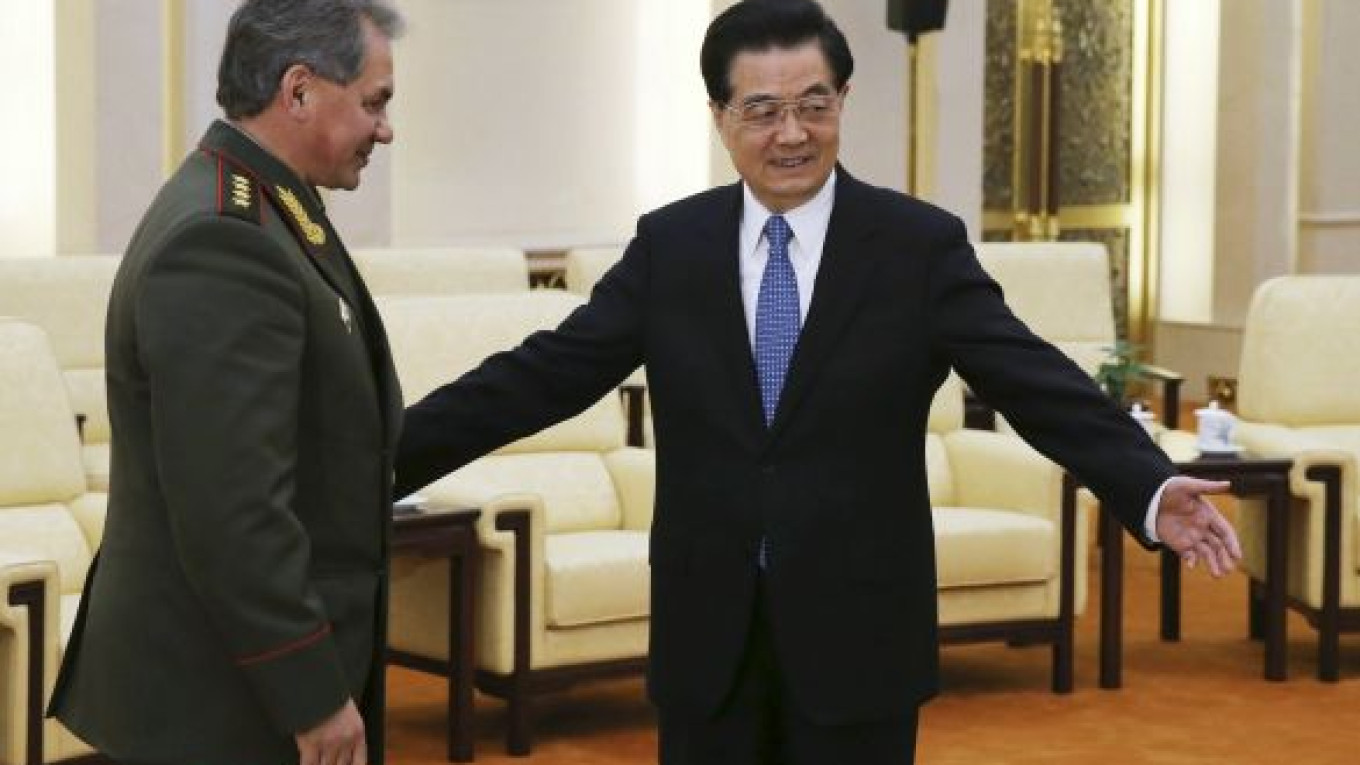Defense Minister Sergei Shoigu met with outgoing Chinese President Hu Jintao in Beijing on Wednesday to discuss bilateral cooperation and potential weapons sales, the first trip by a Russian official to China following a leadership change in the powerful Asian nation.
Shoigu's visit to China, where he arrived Tuesday, is also his first foreign trip as defense minister, a post he was named to on Nov. 6 after former Defense Minister Anatoly Serdyukov was fired amid a corruption scandal at a ministry agency.
Analysts said Shoigu's visit carried special significance because of the leadership reshuffle in China.
Moderate reformer Xi Jinping was proclaimed leader of the ruling Chinese Communist Party at a party congress last week and is expected to lead China over the next decade.
Shoigu, who also met Wednesday with his Chinese counterpart, Central Military Commission deputy head Xu Qiliang, said Russia views mutual cooperation as important to regional stability.
"The higher the level of cooperation between our countries, the calmer our region is," Shoigu said during a meeting of an intergovernmental commission on military cooperation, Russian News Service radio reported.
Hu said China appreciated that Shoigu made the visit so soon after his appointment as minister.
"China values this highly," Hu said at his meeting with the Russian defense minister.
Trade between Russia and China amounted to a record-high $83 billion in 2011, and the two countries often cooperate on key international issues, including the Syria conflict. The two countries have blocked UN efforts led by the West to take harsher measures against the regime of Syrian President Bashar Assad, engaged in a civil war with rebel forces.
But liberal-leaning economist Vladislav Inozemtsev said China and Russia lack a foundation for a closer partnership.
"Russia and China do not have contradictions that make them enemies, but there is no reason for a strong alliance," Inozemtsev said in a recent opinion piece in the magazine Ogonyok.
The two countries are founding members of the Shanghai Cooperation Organization, or SCO, a regional security body established in 2001, and they have conducted several joint exercises together.
Theodor Karasik, a senior analyst at the Enegma think tank in Dubai, said the countries are interested in strengthening their cooperation.
"Shoigu must spell out Russia's intentions in the defense field, especially in the SCO," he said.
Russia and China have done arms deals worth $16 billion since 2001, most of which have been Chinese purchases of Russian weapons.
The level of cooperation had decreased in recent years, but last year it picked up, with more than $1 billion in deals done, Rosoboronexport arms exporter head Anatoly Isaikin told Kommersant. China currently accounts for up to 15 percent of Russian arms sales.
Igor Korotchenko, head of the Defense Ministry public council, said a drop in Russian-Chinese military cooperation was inevitable since China is becoming more technologically advanced.
"We are now facing real competition with China over certain markets," Korotchenko noted, referring to Chinese arms sales to countries in Africa and Latin America.
Vedomosti reported Wednesday that Russia and China have reached a preliminary agreement on the sale of Su-35 fighter jets to the Chinese armed forces.
The Chinese side might buy 24 Su-35 planes, a modernized version of the Su-27, for $1.5 billion, an official at the Federal Service for Military and Technical Cooperation told the daily.
China had expressed interest in purchasing only four planes, while Russia wanted the Chinese to buy more. Korotchenko said Russia also wants China to sign a written agreement not to make copies of the plane.
While Moscow has never officially complained to Beijing about Chinese attempts to copy Russian weapons, some military experts say the practice is widespread and causes tension in bilateral military cooperation.
In 2004, China opted not to prolong a licensing contract to produce Su-27 jets and started to make unlicensed copies of the plane, a military industry source told Vedomosti on Tuesday.
A spokesman for jet producer Sukhoi declined to comment on the situation.
Russia and China have also said they would be interested in cooperating to produce a helicopter on the base of the Russian Mi-26, a Russian Helicopters representative said earlier this month, Interfax reported.
Some Russian military pundits do not favor closer Russian-Chinese military cooperation, saying they view Russia's southern neighbor as a potential adversary.
"I don't think we should increase cooperation going forward; we should decrease it," said Alexander Khramchikhin, an expert at the independent Institute of Political and Military Analysis in Moscow.
While this week's visit to China was Shoigu's first since becoming defense minister, he has a long and well-established relationship with the country's government dating from his tenure as Russia's emergency situations minister for much of the last 15 years.
Shoigu worked in the Krasnoyarsk region in Siberia in the 1970s and '80s and has expressed interest in establishing a corporation to develop Siberia and the Far East, which has close trade ties with China.
Related articles:
A Message from The Moscow Times:
Dear readers,
We are facing unprecedented challenges. Russia's Prosecutor General's Office has designated The Moscow Times as an "undesirable" organization, criminalizing our work and putting our staff at risk of prosecution. This follows our earlier unjust labeling as a "foreign agent."
These actions are direct attempts to silence independent journalism in Russia. The authorities claim our work "discredits the decisions of the Russian leadership." We see things differently: we strive to provide accurate, unbiased reporting on Russia.
We, the journalists of The Moscow Times, refuse to be silenced. But to continue our work, we need your help.
Your support, no matter how small, makes a world of difference. If you can, please support us monthly starting from just $2. It's quick to set up, and every contribution makes a significant impact.
By supporting The Moscow Times, you're defending open, independent journalism in the face of repression. Thank you for standing with us.
Remind me later.


